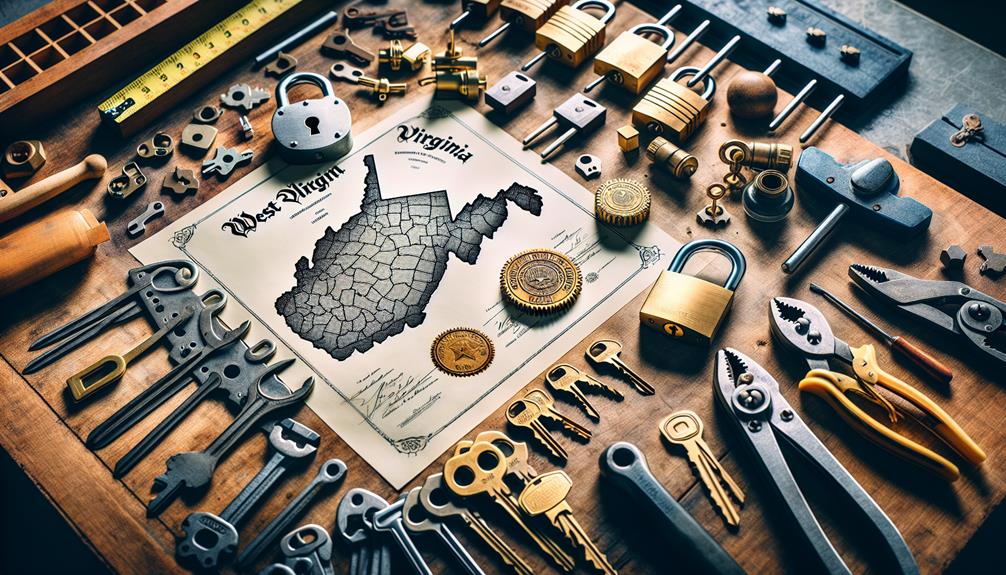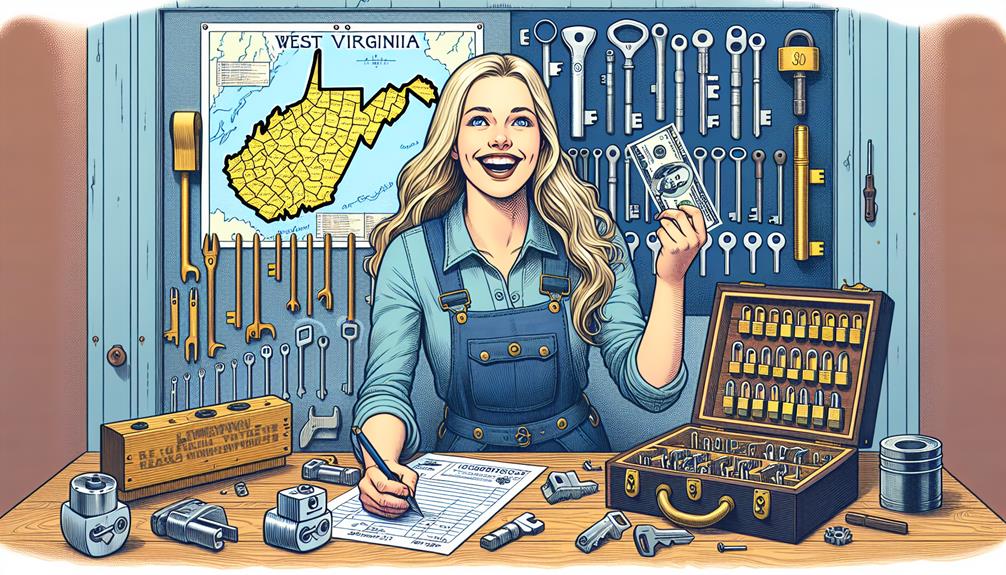Imagine you’ve just helped a stranded traveler gain access to their car on a chilly West Virginia evening, and the gratitude in their eyes reaffirms your choice to become a locksmith in West Virginia. It’s a profession that not only requires technical skill but also offers the satisfaction of solving urgent problems for people in your community.
As you consider this path, you’ll find that West Virginia’s approachable entry requirements are an advantage, with no formal licensing to slow you down. However, don’t mistake ease of entry for a lack of professionalism; successful locksmiths in the state often pursue certifications and continuous training to stand out.
You might be wondering about the potential earnings and the steps you need to take to launch your own locksmith business. With the right guidance, you can unlock the secrets to a rewarding career that combines independence, skill, and the potential for a stable income.
Stay tuned to uncover the crucial steps and resources that can help you turn the key to a successful locksmithing career in the Mountain State.
Key Takeaways
- Becoming a locksmith in West Virginia does not require a specific education degree or training certification.
- Good moral and ethical background is important for aspiring locksmiths in West Virginia.
- Locksmiths in West Virginia can start their own business with minimal investment, as the trade is not regulated and no license is required.
- Obtaining locksmith training from a trade school or through apprenticeship is recommended, and joining a reputable trade association can provide industry knowledge and support.
Understanding Locksmith Qualifications

To excel as a locksmith in West Virginia, you’ll need a blend of practical skills, mechanical aptitude, and an understanding of the latest security technologies. Delving into the locksmith job market in West Virginia, you’ll find that opportunities are often ripe for those who demonstrate expertise and a strong work ethic. Locksmith apprenticeships offer an invaluable pathway, bridging the gap between theoretical knowledge and hands-on experience. You’ll learn the ropes from seasoned professionals, picking up the tricks of the trade in real-world scenarios.
As you explore this career, it’s essential to know that while formal education isn’t mandated, a well-rounded skill set is crucial. You should be comfortable with both traditional lock mechanisms and modern electronic systems. Building a reputation for reliability and skill can set you apart in this competitive field. The locksmith job market in West Virginia leans towards those with a proactive approach to learning and customer service.
Getting ahead means staying abreast of technological advancements and continually refining your skills. Remember, your ability to adapt and grow with the industry won’t only enhance your service offering but can also lead to a thriving locksmith business.
Steps to Locksmith Certification

While honing your practical skills and keeping up with the latest technology are fundamental, obtaining locksmith certification is a structured way to validate your expertise and can significantly boost your credibility in the field. To kick-start your journey, explore locksmith training options in West Virginia, which may include online courses or hands-on apprenticeships.
You’ll need to meet the basic requirements for locksmith apprenticeships in West Virginia, which typically involve being at least 18 years old and having a clean criminal record. Apprenticeships offer the dual advantage of practical experience and mentorship under seasoned professionals. They’re an excellent way to gain the hands-on skills necessary for the trade.
Once you’ve completed your training or apprenticeship, you can opt for certification through a recognized body. This step, though not mandatory in West Virginia, showcases your commitment to the craft and can enhance your employment prospects.
Starting Your Locksmith Business

Once you’ve mastered the necessary skills and understand the locksmithing industry, it’s time to embark on the entrepreneurial journey of starting your own locksmith business in West Virginia. The road ahead will demand dedication and a sharp focus on obtaining necessary permits and devising a robust plan for marketing your locksmith business.
Before you unlock the door to your new venture, make sure you’re equipped with all the legal requirements. This includes registering your business and obtaining any necessary permits that ensure you’re operating within local laws. After all, a strong foundation in compliance sets the stage for long-term success.
As you craft your business plan, highlight the importance of marketing your locksmith business. An effective marketing strategy will not only introduce your brand to potential customers but also establish trust and credibility in your local community.
| Step | Emotional Impact | Outcome |
|---|---|---|
| Legal Compliance | Peace of Mind | Smooth Operations |
| Professional Branding | Confidence in Service | Customer Loyalty |
| Targeted Marketing | Connection with Community | Business Growth |
Training Opportunities and Resources

Having established the legal and marketing foundations for your locksmith business, it’s crucial to turn your attention to enhancing your skills through the various training opportunities and resources available.
Locksmith apprenticeships in West Virginia offer a hands-on approach to learning the trade. By working alongside experienced professionals, you’ll gain practical knowledge that’s indispensable in this field. Apprenticeships are a time-tested method to master the intricacies of locksmithing, from key cutting to lock installation.
Simultaneously, online locksmith training programs in West Virginia provide flexibility and convenience. These programs are designed to fit around your schedule, allowing you to learn at your own pace. They cover a wide array of topics, including the latest security technologies and business management techniques essential for today’s locksmiths. By enrolling in such a program, you can ensure that you’re up-to-date with modern locksmithing practices without having to leave the comfort of your home.
Both apprenticeships and online courses offer unique benefits, and you might find that a combination of the two best suits your learning style and business goals.
Locksmith Salary Insights

Understanding the potential earnings in the locksmith profession is crucial as you consider this career path in West Virginia. The locksmith job market can vary, with factors such as location, experience, and the economy playing significant roles in determining your potential salary. By engaging in reputable locksmith training programs, you can enhance your skill set, making you more competitive and possibly increasing your earning power.
Here’s a quick glance at some salary insights:
| Experience Level | Average Annual Salary | Hourly Rate Equivalent |
|---|---|---|
| Entry-Level | $25,000 – $30,000 | $12 – $14 |
| Mid-Level | $30,000 – $40,000 | $14 – $19 |
| Experienced | $40,000+ | $19+ |
Frequently Asked Questions
Are There Any Ongoing Educational Requirements for Locksmiths in West Virginia to Maintain Their Skills and Knowledge?
In West Virginia, while there aren’t formal ongoing education mandates for locksmiths, you’ll benefit from continuous education to keep your skills sharp.
Staying abreast of new technologies and techniques is key. Skill updates not only enhance your service quality but also ensure you remain competitive in the field.
Take advantage of workshops, online courses, and trade publications to stay informed and adept in your locksmithing career.
What Kind of Background Checks or Security Clearances, if Any, Might Be Required for a Locksmith Working With Sensitive or Government Facilities in West Virginia?
If you’re aiming to work at sensitive or government sites in West Virginia, you’ll likely face stringent background checks. They’ll assess your background relevance and may require various clearance levels.
It’s crucial you’ve got a clean record and trustworthy reputation. Remember, these clearances are pivotal; they’re not just formalities but essential for the integrity of the facilities you’ll service.
Stay prepared for a thorough vetting process.
Can Locksmiths in West Virginia Specialize in Certain Areas, Such as Automotive or Electronic Security Systems, and What Additional Training Might Be Required for These Specializations?
Yes, you can specialize as a locksmith in West Virginia.
One area of specialization is automotive locksmithing, where key coding is essential.
Another specialization option is in safes, where you can master safe cracking techniques.
To gain expertise in these specializations, additional training is usually required.
This training typically involves dedicated courses or apprenticeships that provide both theoretical knowledge and hands-on experience.
By honing these specialized skills, you’ll be able to set yourself apart from other locksmiths.
Furthermore, you’ll be able to cater to specific customer needs within the locksmith industry.
How Does the Cost of Living in West Virginia Impact the Salary and Rates That Locksmiths Can Charge for Their Services?
West Virginia’s lower cost of living means you’ll find your locksmith services’ rates are influenced by local market demand. You can charge competitive prices while maintaining a decent income.
However, cost comparison with neighboring states is crucial; it ensures you’re not underpricing your expertise. Stay informed about regional economic trends to adjust your rates and align with the current market, ensuring your business thrives.
Are There Any Specific Insurance Requirements or Recommended Coverage Amounts for Locksmiths Operating in West Virginia to Protect Their Business and Clients?
In West Virginia, you’re not legally required to carry specific insurance policies as a locksmith, but it’s smart to protect your business.
Consider general liability insurance with adequate coverage limits. It’ll safeguard against potential claims from accidents or damages.
You’ll want to consult an insurance agent to tailor your policy to your operation’s size and risk level, ensuring you’ve got the right protection for peace of mind.








